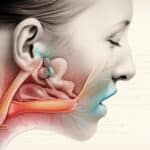Headache and Ear Ringing: Unearthing the Hidden Connection and Solutions
- Get link
- X
- Other Apps
Introduction
The human body is complex. Its myriad systems work in harmony to ensure we function efficiently. But what happens when two seemingly unrelated symptoms occur simultaneously, such as a headache and ear ringing? Does it indicate a deeper health issue? Let’s delve into this intriguing topic.
What is Tinnitus and What Does it Feel Like?
Tinnitus is an auditory nuisance that manifests as a ringing, buzzing, whistling, or hissing sound in your ears. It’s like a phantom sound, perceived in the absence of an external auditory stimulus. Now, don’t worry. You’re not hallucinating. But what causes such an experience?
Well, tinnitus is an outcome of various factors, some external like noise exposure, and some internal like advanced age or stress, as explained in the blog post What Causes Ear Tinnitus. It’s even associated with hearing conditions. Are all encountering the same kind of tinnitus noise? Not exactly. Reports range from a mild humming to an excruciatingly high pitch, and the Ringing Ear Sound registered can differ for each person.
Just like the difference in sounds, the types of tinnitus also vary considerably. There are Kinds of Tinnitus types, such as subjective and objective tinnitus, to name a few, each with distinct characteristics and respective triggers.
Understanding Headaches
Everyone has experienced a headache at some point. An annoying throb that makes daily tasks feel like an uphill battle. From tension headaches to migraines, cluster headaches to sinogenic headaches, there are numerous types, each with unique triggers that can range from stress, anxiety, dietary preconditions, or simply not consuming enough water in a day!
Tinnitus and Headache: Is There A Link?
The coupling of a throbbing headache and persistent tinnitus might appear random, but they might link back to the same root cause. Consider migraines, these debilitating headaches can be linked to tinnitus through shared neural pathways. Don’t take our word for it, take a look at the post Migraines and Tinnitus.
But, what if your headache and tinnitus are only one-sided? Could it signify a more severe health issue? Not necessarily, but it’s worth your attention. Check out the post Tinnitus and Headache on One Side to get a better understanding.
Also, if you notice your tinnitus becoming increasingly unbearable with worsening headaches there might be more to the story. As explored more in-depth in the post, Worsening Tinnitus and Headache.
Underlying Conditions that Cause Tinnitus and Headaches
While these symptoms might pop up together every now and then, it’s essential to understand that they’re not mere random occurrences. Several underlying conditions might lead to both tinnitus and headaches, two of the most prevalent being high blood pressure and Temporomandibular Joint (TMJ) disorder.
High blood pressure or hypertension influences many things in your body – yes, including your ears! That pounding pressure in your head could be a headache, but it could also cause a phantom ring in your ears. Learn more about the connection between Ear Ringing and Blood Pressure to better understand it.
Now, TMJ disorder – it sounds complex, right? Frankly, it isn’t. Simply put, it’s the disorder of the hinge connecting your jaw to the rest of your skull. Sounds unrelatable? Remember the last time you clenched your teeth in anger or ground them while asleep? That puts undue pressure on your TMJ, leading to a headache, and people often report ringing in their ears associated with it. The blog post TMJ Causes Tinnitus explains this connection in detail.
How to Manage Tinnitus and Headaches
Dealing with tinnitus and headaches can be, quite literally, a pain. But there are ways to manage these conditions effectively. Begin with pinpointing the triggers. Monitor when your tinnitus flares up or when your headaches intensify. By doing so, you can avoid specific triggers.
There are several lifestyle modifications and treatments to allay tinnitus. Remember, a tranquil environment could make tinnitus much more noticeable! The brain tries to compensate for the quiet by ramping up its sensitivity, and it’s now you would notice those phantom noises. That’s where white noise comes in. White noise, with its consistent soothing sound, can balance the auditory input and distract your brain from the quieter tinnitus noise. The post White Noise and Tinnitus has additional insights into this important tool!
For headaches, relaxation techniques, mindfulness practices, and regular exercise can be effective remedies. Don’t forget to keep hydrated and maintain a balanced diet. Consider speaking to health experts for advice, and do not shy away from seeking help!
Remember, it’s about learning to manage your symptoms, and sometimes, small changes can have a profound impact! One step at a time, right?
When Should You Seek Professional Help?
While it’s crucial to learn self-management methods, it’s equally important to know when to seek professional help. Persistent tinnitus and regular headaches should not be taken lightly. If these symptoms persist or intensify over time, it could indicate a more serious issue. Medical intervention could either help manage the symptoms effectively or unearth an underlying health issue needing attention.
Want to know some more signs that mandate a visit to the doctor? Do visit When Should I Worry About Tinnitus to get a comprehensive list of such red flags. And when you decide to book your appointment, remember to reach out to a certified professional. The domain is a complex one, and you need someone who understands it inside out! Don’t know where to start? Get some advice on the Best Doctor for Tinnitus.
Conclusion
Navigating your way through tinnitus and headaches might feel like sailing through a storm initially. But once you understand the connection and how various triggers affect both these conditions, you will feel more in control. From identifying underlying conditions like high blood pressure and TMJ disorder to using white noise for tinnitus management, there are various strategies at your disposal. And remember, no condition is too trivial to get medical attention! If you fear that your tinnitus or headaches are taking a toll on your quality of life, never hesitate to seek professional advice. Knowledge is power, and understanding your own body is the first step in your road to recovery!
Headache And Ear Ringing - Frequently Asked Questions (FAQ)
Yes, tinnitus can sometimes cause headaches. Certain conditions such as migraines can cause both tinnitus and headaches. Additionally, stress and anxiety, often associated with tinnitus, can also lead to headaches. It’s important to consult a doctor if you are consistently experiencing both symptoms.
There are several ways to manage these conditions, including lifestyle modifications such as stress management, regular exercise, and a balanced diet. Certain treatments, such as white noise for managing tinnitus, can also be effective. If these symptoms persist, it’s crucial to seek medical advice for proper diagnosis and treatment.
Conditions like high blood pressure and Temporomandibular Joint (TMJ) disorder can lead to both tinnitus and headaches. Additionally, certain types of migraines can also cause these symptoms. It’s important to see a healthcare professional if you consistently experience these symptoms to identify any potential underlying conditions.
If tinnitus and headaches persist or intensify over time, it’s important to seek professional help. Persistent or worsening symptoms could indicate a more serious health issue needing attention. It’s recommended to reach out to a certified professional who understands these complex conditions.
Absolutely. Daily habits and lifestyle choices can play a significant role in the onset and severity of both headaches and ear ringing (tinnitus). Factors such as prolonged exposure to loud noises, high caffeine or salt intake, stress, lack of sleep, and even certain medications can trigger or exacerbate these symptoms. It’s essential to monitor and identify potential triggers in your daily routine. Making simple adjustments, like reducing caffeine intake, using ear protection in noisy environments, or practicing relaxation techniques, can help manage and even prevent these symptoms. Always consult with a healthcare professional if you’re concerned about the frequency or intensity of your headaches and tinnitus.
The post Headache and Ear Ringing: Unearthing the Hidden Connection and Solutions appeared first on Pulsatile Tinnitus Treatments News - Tinnitus Relief.
Related posts:
https://ift.tt/Sk5gTtJ
#tinnitus #pusatiletinnitus #earringing #whatistinnitus #howtostoptinnitus
- Get link
- X
- Other Apps



Comments
Post a Comment